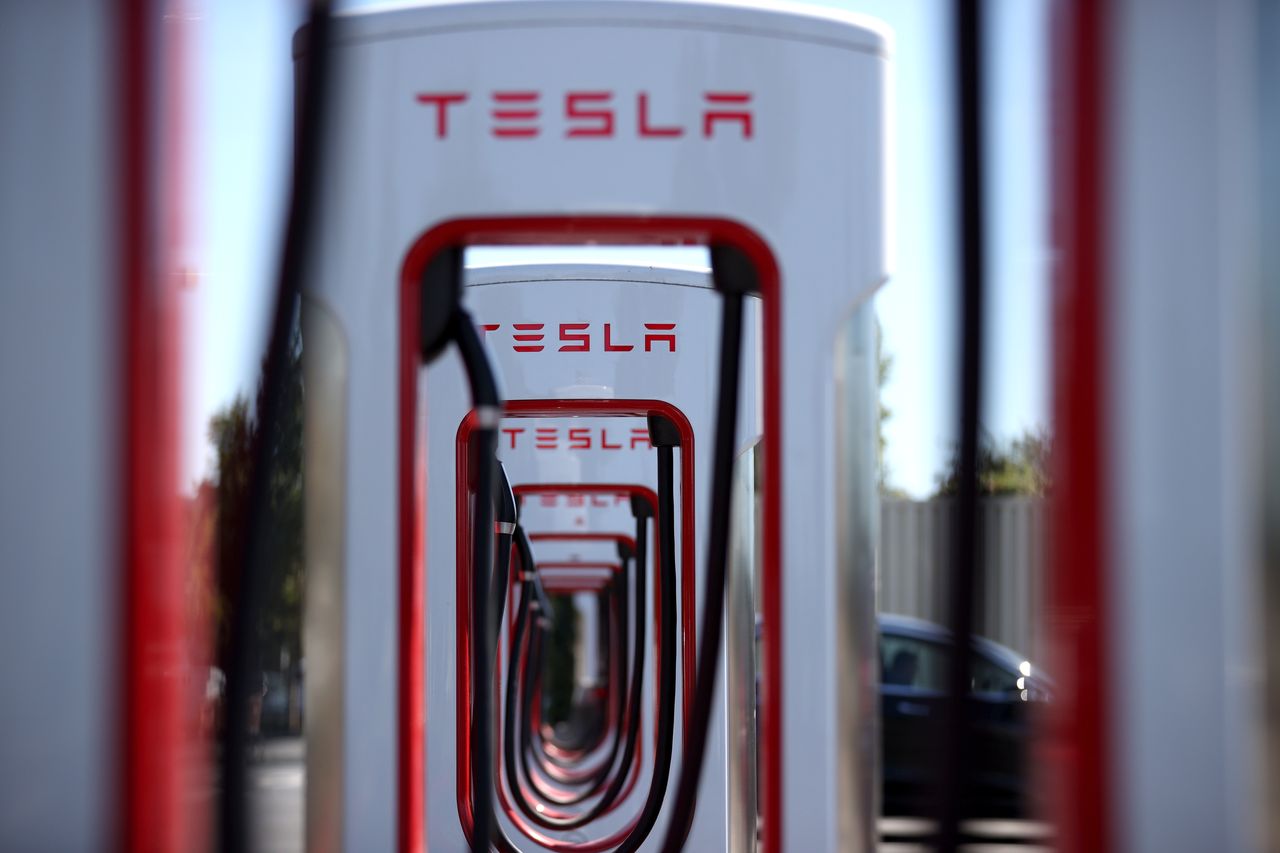How Much Is Tesla Software Worth? A Lot.
A second broker has taken a shot at valuing Tesla’s software business.
A second broker has taken a shot at valuing Tesla’s software business. The conclusion, good news for the company and for other carmakers, is that Tesla software is worth a lot.
UBS analyst Patrick Hummel took a look at some of the value hidden away in Tesla (ticker: TSLA). The idea that some might still be undiscovered within the world’s most valuable automaker, whose stock has trounced the competition, might seem oxymoronic. But bulls believe Tesla is more than just a car company, given that it sells solar panels, insurance, and importantly, software.
Hummell isn’t a full Tesla bull. He rates shares at Hold and has a target of $730 for the share price. He believes other automakers will have some success ramping up sales volumes for EVs, but that “Tesla remains the undisputed tech leader, most notably in software.”
At his price target. well above the stock’s current level of about $686, Tesla would be worth roughly $700 billion. He values the car business at roughly $200 billion, leaving about $500 billion for everything else.
“The lion’s share of this value can be generated by software, mainly autonomous driving,” wrote Hummell in a Wednesday report. “Out of $20 [billion operating profit] we expect Tesla to generate in 2025, $9 [billion] should already be software-driven.”
That almost half of profit would come from software by 2025 is surprising. Most of that would be from Tesla’s autonomous-driving package, called full self-driving mode, which sells for $10,000 today. To make more money, Tesla could improve the rate at which consumers choose that option, as well as potentially offering it via a monthly subscription.
Hummell isn’t the only one that values Tesla software highly. Morgan Stanley analyst Adam Jonas has taken a sum-of-the-parts approach to valuing Tesla stock, looking at the different businesses separately. He values Tesla’s software and services business at roughly $250 billion.
That’s lower than Hummell’s call, but Jonas still rates Tesla stock at Buy, with a target of $880 for the share price. Jonas believes the Tesla car business is more valuable than Hummell does, valuing it at roughly $350 billion.
All the value and profit coming from software isn’t just a benefit to Tesla. Other auto makers plan similar products. Ford Motor (F) already plans to offer products related to its fleet of commercial vehicles around the globe. General Motors (GM) still has On Star. And Tesla peer NIO (NIO) is considering the idea of selling its autonomous-driving software as a subscription.
The theoretical valuation discussions about hidden assets, however, weren’t helping Tesla stock Wednesday. Shares were down about 0.6% in midday trading. in line with the S&P 500. The Dow Jones Industrial Average was up about 0.1%.
The stock is down about 15% over the past couple of weeks, but is still more than 350% higher over the past year.
 Copyright 2020, Dow Jones & Company, Inc. All Rights Reserved Worldwide. LEARN MORE
Copyright 2020, Dow Jones & Company, Inc. All Rights Reserved Worldwide. LEARN MORE
This stylish family home combines a classic palette and finishes with a flexible floorplan
Just 55 minutes from Sydney, make this your creative getaway located in the majestic Hawkesbury region.
Continued stagflation and cost of living pressures are causing couples to think twice about starting a family, new data has revealed, with long term impacts expected
Australia is in the midst of a ‘baby recession’ with preliminary estimates showing the number of births in 2023 fell by more than four percent to the lowest level since 2006, according to KPMG. The consultancy firm says this reflects the impact of cost-of-living pressures on the feasibility of younger Australians starting a family.
KPMG estimates that 289,100 babies were born in 2023. This compares to 300,684 babies in 2022 and 309,996 in 2021, according to the Australian Bureau of Statistics (ABS). KPMG urban economist Terry Rawnsley said weak economic growth often leads to a reduced number of births. In 2023, ABS data shows gross domestic product (GDP) fell to 1.5 percent. Despite the population growing by 2.5 percent in 2023, GDP on a per capita basis went into negative territory, down one percent over the 12 months.
“Birth rates provide insight into long-term population growth as well as the current confidence of Australian families,” said Mr Rawnsley. “We haven’t seen such a sharp drop in births in Australia since the period of economic stagflation in the 1970s, which coincided with the initial widespread adoption of the contraceptive pill.”
Mr Rawnsley said many Australian couples delayed starting a family while the pandemic played out in 2020. The number of births fell from 305,832 in 2019 to 294,369 in 2020. Then in 2021, strong employment and vast amounts of stimulus money, along with high household savings due to lockdowns, gave couples better financial means to have a baby. This led to a rebound in births.
However, the re-opening of the global economy in 2022 led to soaring inflation. By the start of 2023, the Australian consumer price index (CPI) had risen to its highest level since 1990 at 7.8 percent per annum. By that stage, the Reserve Bank had already commenced an aggressive rate-hiking strategy to fight inflation and had raised the cash rate every month between May and December 2022.
Five more rate hikes during 2023 put further pressure on couples with mortgages and put the brakes on family formation. “This combination of the pandemic and rapid economic changes explains the spike and subsequent sharp decline in birth rates we have observed over the past four years,” Mr Rawnsley said.
The impact of high costs of living on couples’ decision to have a baby is highlighted in births data for the capital cities. KPMG estimates there were 60,860 births in Sydney in 2023, down 8.6 percent from 2019. There were 56,270 births in Melbourne, down 7.3 percent. In Perth, there were 25,020 births, down 6 percent, while in Brisbane there were 30,250 births, down 4.3 percent. Canberra was the only capital city where there was no fall in the number of births in 2023 compared to 2019.
“CPI growth in Canberra has been slightly subdued compared to that in other major cities, and the economic outlook has remained strong,” Mr Rawnsley said. “This means families have not been hurting as much as those in other capital cities, and in turn, we’ve seen a stabilisation of births in the ACT.”
This stylish family home combines a classic palette and finishes with a flexible floorplan
Just 55 minutes from Sydney, make this your creative getaway located in the majestic Hawkesbury region.






















